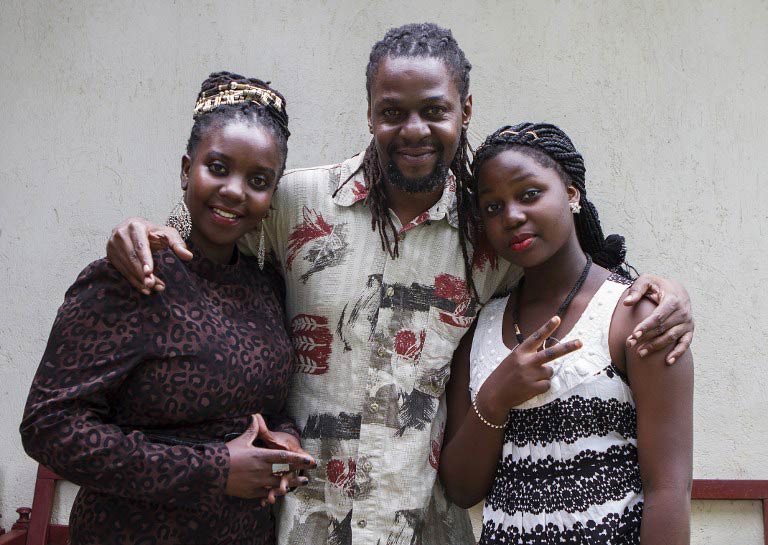
“Newzbeat” makes a catchy change from a standard news bulletin: Ugandans call the broadcasters “rap-orters”, a youth team of hip-hop artists-turned-journalists rapping the headlines.
“Uganda’s anti-gay law is making news/Some countries have found it befitting to accuse/Uganda of treating gays as German Jews/Nothing to gain from this and more to lose,” rapped the artists in one recent episode.
That song focused on a law signed by President Yoweri Museveni banning homosexuality, which drew widespread international condemnation. US Secretary of State John Kerry likened it to anti-Semitic legislation in Nazi Germany.
“President Museveni says he won’t bow down to the West/Uganda has a right to decide what’s best,” the rap continued.
Hearing the news in hip-hop style may sound strange. But in Uganda, where the press faces censorship pressures and the country’s huge youth population often takes little interest in current affairs, a programme where “rap-orters” broadcast with “rhyme and reason” has become popular.
“NewzBeat“, screened in both English and the local language Luganda on the popular channel NTV every Saturday afternoon and evening before the station’s traditional news bulletins, took to the air last year.
‘Push the boundaries’
The show is presented by Sharon Bwogi, Uganda’s “queen of hip hop” known as Lady Slyke, the dreadlocked and eloquent Daniel Kisekka, dubbed the “Survivor”, and teenage rapper Zoe Kabuye, or MC Loy.
It aims to “promote diversity and visibility for marginalised groups” and “push the boundaries of press limitations” in Uganda, according to Lady Slyke.
“At first we had some complaints, people were saying ‘We’re not really understanding what you’re doing’,” the designer and artist, who was inspired by church music to start rapping when she was 13, told AFP.
But Bwogi added that today people from all walks of life followed the programme, including businessmen and government ministers.
“People keep asking for more and asking me questions about certain topics,” said Bwogi, 28, who also raps at venues across Uganda professionally. “I think they love the whole flavour.”
“NewzBeat”, which runs for about five minutes an episode, usually features about four local, regional and international stories.
Nothing is off limits. The programme has “rap-orted” stories on Uganda’s anti-pornography laws,the political situation in Ukraine and Ebola updates from west Africa.
Challenging political leaders
Corruption is another favourite topic.
“All around the world this problem remains/The abuse so far is keeping people in chains,” rapped Kisekka in a bulletin on graft. “But lately some signs of hope have made the headlines/Of corrupt officials being handed heavy fines.”
Bwogi said “NewzBeat” talked about corruption since graft was a major problem for Uganda.
“Sometimes if you want to be attended to… you need to pay a little something,” she said.
Often local reporters run into trouble trying to highlight this problem.
Uganda’s Human Rights Network for Journalists and other activist groups have repeatedly warned that the space for reporters to operate freely in the east African country is shrinking.
Last October, one journalist was ordered to pay damages or face jail after accusing a government official of corruption, and there have been other similar cases.
Kabuye, 14, who has rapped on everything from the Egyptian single mother who spent 43 years living as a man to the national identification registration, said many of her friends are disinterested in the news.
“They used to say it’s boring, but when they see ‘NewzBeat’, they’re like ‘what’s the time?'” said the student, who has been rapping since 2009 and now juggles her “NewzBeat” commitments with her homework.
Kisekka, 40, said that in the beginning many viewers dismissed the show as “just entertainment”, but they have come to “appreciate the art form and start listening to the news”.
People were now taking rap more seriously, the artist said.
“It is not just talking about women and booze and all that, it’s delivering the news,” said Kisekka.
For the future, “NewzBeat” staff are looking at recruiting specialist “rap-orters” to cover fields such as science and technology. They are also keen to expand across Africa.
In Tanzania, a mini-season of four episodes recently aired and another four are set to run in the lead-up to the country’s elections, scheduled for October.
“Media belongs to the power of the day,” Bwogi rapped in one episode. “The Chinese have CCTV/the British have BBC/And we too are making our voices heard on NTV.”
